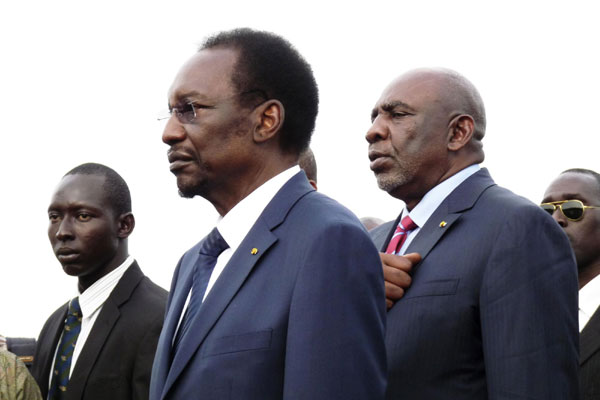Mali's president returns home amid political differences
Updated: 2012-07-29 15:23
(Xinhua)
|
|||||||||||
BAMAKO - Mali's Transitional President Dioncounda Traore returned to his country on Friday afternoon after undergoing medical treatment in France for the last two months.
Traore went to France to receive medical treatment after having been attacked on May 21 at his presidential palace office by demonstrators who were demanding his departure.
"I am very happy to return to my country which I love very much just like all of you do love it. For me, May 21 does not exist," the Malian president said and promised to address the nation on Sunday.
While still in Paris, Traore declared that he had forgiven all those who attacked him.
 |
|
Mali's interim President Dioncounda Traore (C) arrives at the main airport in the capital Bamako, July 27, 2012.[Photo/Agencies] |
According to some observers, one of the first missions of the Malian president will be the formation of a government of national unity before July 31, in conformity to the recommendations of the ECOWAS (Economic Community of West African States) Contact Group on Mali which met in Ouagadougou on July 7.
The same observers have indicated that once this government has been formed, its double priorities will be: the recovery of the northern regions that are occupied by islamist groups and the organization of free and fair general elections.
The two issues were assigned to the transitional organs in the agreement that was signed in April between ECOWAS and the National Committee for Redressment of Democracy and Restoration of the State (CNRDRE), the military junta that overthrew president Amadou Toumani Toure on March 22.
On the eve of Traore's return to Mali, the political debates were and are still intense regarding the formation of a government of national unity.
Some political groups like the United Front for Safeguarding Democracy and the Republic (FDR, anti-coup d'etat) and its allies had demanded for the resignation of prime minister Cheick Modibo Diarra and his government.
However, the Coordination of Mali's Patriotic Organizations (COPAM, pro-coup d'etat), the Convergence to Save Mali (CSM) and the National Union of Malian Women affirmed that "the prime minister and his governmental team should be maintained."
"The interim period ended on May 22. It's the Speaker of Parliament who returned. I am a member of parliament and therefore it's my colleague who returned. I wish him quick recovery," Oumar Mariko who is the leader of the March 22 Popular Movement that was created after the March 22 coup d'etat, told Xinhua.
Elsewhere, prime minister Diarra vowed on Friday morning that he will not resign.
"Mali has entrusted me with a job to do. Once this country gives me a task to perform, as long as I am alive, I will never resign," Diarra said when he addressed the press.
Speaking of the deadline given by ECOWAS leaders who want the government of national unity to be formed before July 31, the Malian prime minister said that the "date was just tentative and that the formation of a government of national unity could go beyond July 31."
Related Stories
Mali rebels attack northern city of Gao 2012-04-01 06:34
Mali's president hands in resignation letter 2012-04-09 04:33
Traore sworn in as Mali's interim president 2012-04-13 15:48
Today's Top News
President Xi confident in recovery from quake
H7N9 update: 104 cases, 21 deaths
Telecom workers restore links
Coal mine blast kills 18 in Jilin
Intl scholarship puts China on the map
More bird flu patients discharged
Gold loses sheen, but still a safe bet
US 'turns blind eye to human rights'
Hot Topics
Lunar probe , China growth forecasts, Emission rules get tougher, China seen through 'colored lens', International board,
Editor's Picks

|

|

|

|

|

|





